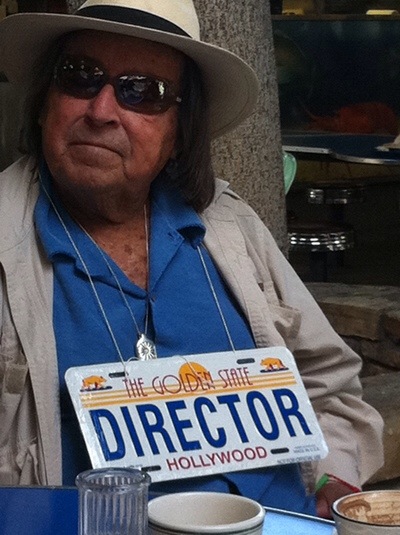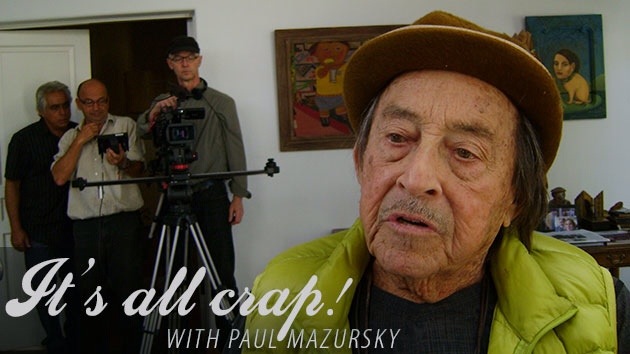

By David Poland poland@moviecitynews.com
Death & Life: Part Two
July 1. 2014. 4p edt
I knew Paul Mazursky for about 10 years.
I am a member of The Table, as we call it. The tradition is, simply, a bunch of guys – and yes, some women – who get together in the mornings to break bread (usually donuts) and talk shit. The common denominator is show business. And the table has enjoyed some of the best writers, directors, actors, comics, artists, execs, journalists, etc for which you could ask. We also have some charming mediocrities, scoundrels, idiots, fools, clowns, and other assorted monkeys. And some great “guest stars.”
Mazursky was the de facto leader. His closest partner in crime remained Charlie Bragg until his last visit. Of course none of us knew it was his last visit when it occurred. And those last few trips to The Table were not Paul at his normal speed.
Given the age group at The Table, mostly over 70 and many over 80, everyone has had his or her share of illness to contend with in this last decade. But amazingly, everyone pulled through. In my decade or so of attending, we had not lost a single regular. We lost a lot of close friends of table regulars. Paul and his wife, Betsy, and their family lost their 50-year-old daughter to cancer.
Most recently, we mourned Ed Lauter, who never sat at The Table, but who did spend mornings at the Farmer’s Market when he wasn’t working and would often stop by, say hello, and get goaded into doing his amazing Monty Clift imitation. The guys would try to get him to also do his Burt Lancaster… because Paul had a good Lancaster… and so does Ronnie Schell… so we could have Burt. Lancaster in 3-point surround sound.
Paul would also do dueling Clark Gables with Ronnie. Paul was also known for his cruel, but funny Andrea Bocelli imitation. And what started as an approximation of Abe Lincoln getting shot would morph into almost anyone getting shot.
He loved theater and we would share word on shows often. The last thing that seemed to blow him away was Mark Rylance in “Jerusalem.” He was not shy about language, but he was underwhelmed by “Book of Mormon” because he felt it devolved into too many raunchy jokes.
Paul would often offer very detailed, strong opinions on films… until someone caught on that he was just making it up and hadn’t seen the film. I think the last film he saw in a theater was The Rover… and he hated it.
He loved The Yankees.
The last time I saw him, The Yankees had lost an ugly one to the Red Sox. The staff at the ICU had been struggling – for hours – to find a vein In his arm for an IV. But somehow, Paul had managed to watch enough of the game to be disgusted.
Paul was often funniest when he was disgusted… or could work up a head of steam pretending to be disgusted. He wore the cloak of leadership at The Table comfortably and would often be the one to drop the bomb on someone – especially guests – when they were working too hard to win the group over. He would just ask whatever question everyone was thinking.
But he was a softie, really. His beloved wife is the sharpest edge in that family, smart, funny, and precise. She might sit silently for a long while… but when the words come, they cut to the quick. A match for Paul.
He was in and out when I last saw him. But he asked about my son by name, as he did almost every time I saw him since Cameron was born. He loved his family. Doted on them. Grandkids. Tommy, Tommy, Tommy. And a great-grandkid. And that dog. That stupid dog. He loved that dog so.
He would tell the story of meeting Fellini and becoming friends. Bertolucci. George Segal was a regular at The Table for a while. Leonard Nimoy. Franco Nero. He lunched with Mel Brooks and Laddie and Mike Gruskoff and recently, Dick Donner on Fridays. Lots of tales about his old agent, Sam Cohn. His 400+ pound comedy partner, Larry Tucker. Working as a kid in Blackboard Jungle. Lots of great, crazy Peter Sellers stories. And for Kubrick on Kubrick’s first feature. Writing The Monkees. Shutting down Hollywood Blvd for Alex in Wonderland.
He had two projects he was chasing hard in his last years. One is called “Fiddleman”… and the stories of who almost signed to do it when were plentiful. And he worked on a stage musical of Moon Over Parador for a number of years with Bill Conti and the guy who writes “Forbidden Broadway.” He was hoping for Raoul Esparza and Roger Bart for a while. Didn’t quite happen.
He was a happy and respectful member of the Academy Board of Governors for a long time. He fought (along with others) for awards for John Calley before he was too ill to show up and accept it. He also fought hard (unsuccessfully) for Alan Ladd, Jr to be honored after a remarkable history. Maybe Disney will help make it happen next year to promote the next Star Wars. He got pushed off the Board of Governors with a selective shove by new management, complaining about a few reviews he wrote for a Vanity Fair a few years ago. That’s the new Academy, I guess. But that’s another column.
The last year, in particular, was a rough one for Paul, physically. A perfectly terrible storm. Whatever got fixed, something else sprung a leak. Aging ain’t for the weak. But Paul was a hard ass.
He last was at the table a couple of weeks ago. He was clearly exhausted. But he wanted to show up… participate… live.
I brought him my screener of Land Ho! to watch. (Sorry, SPC.) It’s about two older men going on an adventure… all about life. I was really hoping he’d recover enough to watch the film and take some pleasure from it.
We talked about my trip to New York. We talked about Cameron. The World Cup. The Yankees. How shitty the food was at the hospital. Others from The Table coming to see him. Glenn, one of his assistants, who was on a 48-hour shift with him, sleeping in the chair in his room.
His last words to me were, “That fucking think is driving me crazy!” He was referring to the alarm on his body monitor, which apparently buzzed without purpose much of the time. I examined the thing, saw a button that said, “Silence,” and pushed it, hoping it was referring to the machine and not Paul. And there was silence. Noticing changed on the monitors. Paul slipped back into sleep. And she two nurses came in to poke or prod him some more, I slipped out.
The funny thing was, as sick as he was… as many tubes were going in and on him from every direction… as hard as he was fighting just to say a few words… his hair looked great.
I woke up suddenly in the middle of the night, here on the east coast. There was a e-mail from another member of The Table who was very close to Paul, Gregg. “If you are awake, call me.” Busy signal. But there was only one reason for such an e-mail. Paul had died around 9:30p… less than 24 hours since I was there with him. So glad I went.
I know his family will be okay. Betsy is a rock and they have had time to get used to the idea that this moment was not too far off. But there is never anything too comfortable at a time like this.
I’ll be 50 later this year. I’m just at the beginning of this cycle of loss in my life. But here we are.
Love to you, Paul. Maybe I will do some writing about your films soon. I loved so many of them long before I even met you. I can even forgive The Pickle… though Paul would explain why he still loved that film and how it could have worked at the drop of a joke.
He was talented. He was charmed. He was dead serious. And he was an absolute goof.
He is dearly missed.

















David, that was a beautiful, sweet and accurate yet not sentimental
(although I did mist up a few times) piece on our Alpha Male leader.
However as the saying goes,
“The dogs bark and the caravan moves on.’
That is so deep that I have no idea what it means.
But your piece about Paul was really special.
Thank you,
Charlie